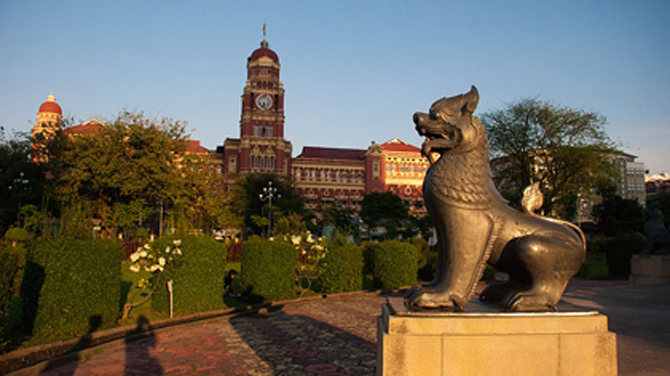Burmese Legal System Remains Tool of Govt: AHRC

A leading human rights group has condemned the politicization of Burma's judiciary just as a widely criticized government lawsuit against a prominent journal has been dropped.
Burma's Ministry of Construction (MoC) launched a defamation action against Modern Weekly journal after an article was published which criticized the state of Mandalay's roads, prompting accusations that this was a new tactic to silence dissenters.
Although the lawsuit has now been dropped, a similar one by the Ministry of Mining remains against The Voice Weekly after the journal printed allegations of graft revealed in a government audit report.
And now the Asian Human Rights Commission (AHRC) has voiced concerns about corruption and the politicization of Burma's judiciary—specifically concerning judges accepting bribes and following instructions from the executive arm of government.
“The legacy of judicial corruption is today in the foreground of media and public debate, but the anti-corruption rhetoric that we hear is essentially a continuation of the same type of rhetoric that successive military and military-backed regimes iterated for decades,” said the AHRC.
“Nor are the proposals that have been made in the last year to deal with corruption anything new. Most blame and attention is being placed on judges who take bribes, rather than on the systemic features of corruption.
“While judges are scandalized, the participation of all parties in the legal process in the negotiations and trade in justice—including arresting police, investigating officers, station clerks, court clerks, court brokers, prosecutors, bailiffs, bureaucrats and many others in addition to the judges—and how these people network and negotiate through the offices of the system attracts inadequate attention.”
Upper House Speaker Khin Aung Myint told The Irrawaddy in an exclusive interview on Monday that fighting rampant corruption is the most important issue facing Burma today, and that existing legislation is out-of date with proposed amendments due to be submitted to the Union Parliament during the next session.
Pro-democracy icon Aung San Suu Kyi also told reporters earlier this month that the Burmese government still restricts media freedom, and cited the case of The Voice Weekly defamation lawsuit as an example of such gagging.
The AHRC report details the case of a 36-year-old taxi driver named Ko Tin Maung Swe who was beaten to death in December 2010. Police arrested four men over the killing and charged them with murder, but then reduced the offenses due to the choice of weapons used in the attack—specifically bats and sticks instead of knives or swords.
Two assailants were accused of “causing grievous hurt” and received five years imprisonment—two years less than the minimum sentence for this particular offense—while the other two were only charged with “abetment” and got off with time served. The AHRC claims that the presiding judge showed a patent disinterest in proceedings and at times spoke at length on his mobile telephone while witnesses were deposing.
The other case cited by the AHRC concerns Mahn Nyein Maung, a central committee member of the Karen National Union (KNU), who was sentenced to 65 years for belonging to an unlawful association and treason. Guilty verdicts were handed down on March 13 almost immediately after the trial began, but then President Thein Sein quickly issued a pardon and he was released.
While admitting that it may have been “politically expedient” to issue the release in order for Naypyidaw to continue peace negotiations with the KNU, the AHRC criticized the obvious “pantomime” trial and politicizing of the judiciary who knew the pardon was coming and rushed through the case without due process.
“The cases of Tin Maung Swe and Mahn Nyein Maung together speak to two legacies of protracted military authoritarianism on the legal system in Burma—its utter degradation and corruption, its reduction to an apparatus for the trading in justice by its personnel; and, its utter politicization and partisanship, its reduction to an apparatus for delivery of orders from the executive,” said the AHRC.
Meanwhile, a court hearing concerning The Voice Weekly lawsuit set for March 22 has now been postponed.
|
||
|
||
|
||
|
||
|
||
|
||
|
||
|
||
|
||
|
||
- 'My Wife Died From Police Abuse,' Says Husband
- US Says Observer Conditions Don't Meet Int'l Standards
- 159 Observers to Monitor Burma Election
- Govt to Address Breaches of SSA-South Ceasefire: Aung Min
- Burma Investors Pin Hopes on Seminal Sunday
- Malaysia PM Leads 50-Strong Delegation to Burma
- US Congress to Assess Burma's Political Prisoner Issue
- Rangoon Woman in Police Station Death Plunge
- Burmese Army Chief Defends Political Role
- NLD Seeks Election Talks with KIO
